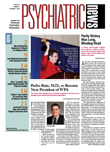Patients who could benefit from effective therapies for posttraumatic stress disorder (PTSD) often cannot get them, for reasons connected to therapists, health care systems and plans, or patients themselves. Thus, experts in the field of trauma care should do more to train therapists and help patients better understand treatment options and benefits, said David Riggs, Ph.D., research associate professor at the Uniformed Services University of the Health Sciences in Bethesda, Md., and executive director of the Center for Deployment Psychology and Research.
“Almost any treatment delivered to a PTSD patient in an empathic, caring way will help [the patient] feel better, at least for a while,” said Riggs at a conference last month in Bethesda, Md., on trauma spectrum disorders. “The real difficulty is helping the last 25 percent who don't respond and [getting] into treatment the people who are not getting it now.”
The conference was cosponsored by the Department of Defense's Defense Centers of Excellence of Psychological Health and Traumatic Brain Injury, the National Institutes of Health, and the Department of Veterans Affairs.
New treatments, medical or otherwise, or combinations of existing therapies are still needed, because not everyone benefits from current practices, he said.
“Even effective treatments don't treat all symptoms of the disorder or comorbid problems and their symptoms,” said Riggs.
Sometimes it isn't clear if every effective treatment should be offered to every patient. The logical answer seems like “yes,” but there are not enough data and not enough clinical trials to be certain.
Riggs said he gets a steady flow of letters from writers about “great new ideas” for treating PTSD. Most of these fall by the wayside because the writers don't want to do the heavy science work to develop, standardize, test the efficacy, and figure out how to disseminate these protocols, he said.
Underutilized treatments—ones that are effective but not used for enough of the patients who would benefit from them—represent another problem, he said. “We can teach therapists what to do, but we don't know if they go back to the clinic and actually do it.”
Providers have to be aware of a specific treatment and then be trained in its use, but still more is needed to get the therapy into widespread use. Often, little attention is paid to building mental health professionals' confidence that they can learn and then deliver the treatment.
“Most training is composed of reading or lectures, but that's not enough,” he said. Closer supervision during clinical training would help professionals understand whether a given treatment would work with the patients they see every day and not just the selected populations included in clinical trials.
“There is little research on these issues,” Riggs told Psychiatric News in a later interview. “In my experience, there are not enough experienced trainers. We should expand face-to-face training aimed at mental health providers rather than primary care providers.”
Another problem may be that health systems must be willing to support the type or frequency of the indicated treatment, given its time, cost, and logistics.
Patients must also be aware of treatments available to them, understand them, and be willing to receive them, said Riggs.
“This is a matter of applied psychology,” he said. “The onus is on us to say we have things to help. This is a problem that pharmaceutical companies' direct-to-consumer marketing has solved very effectively.” ▪
